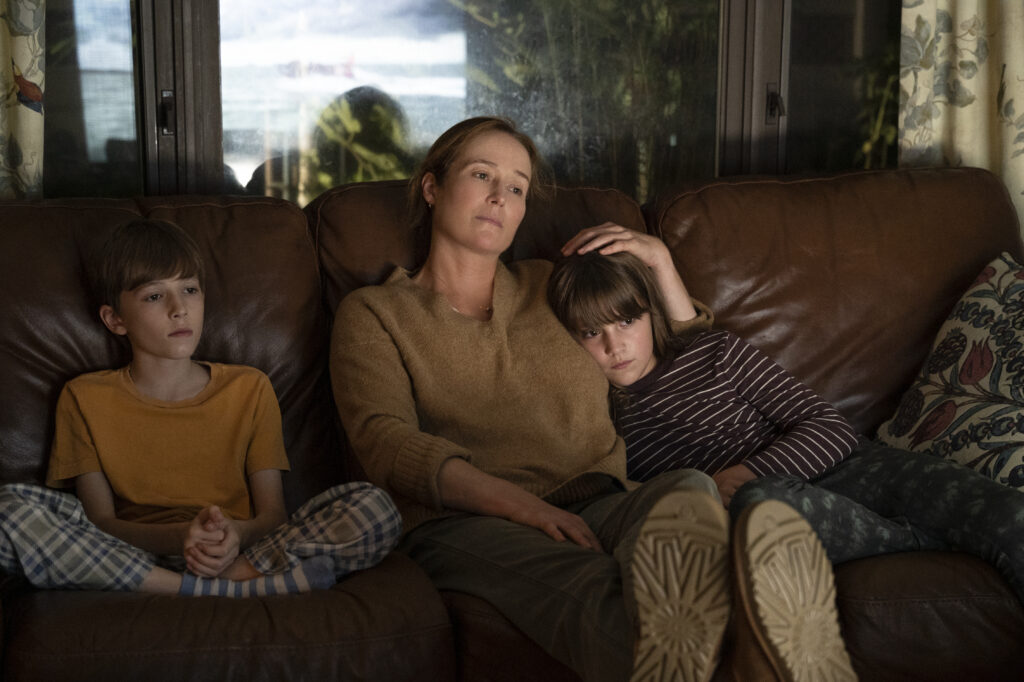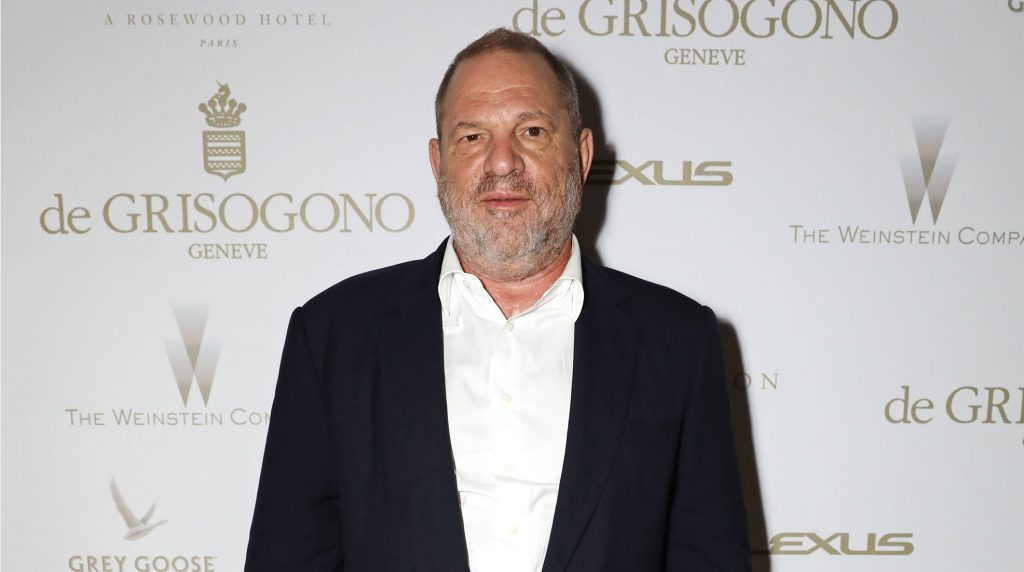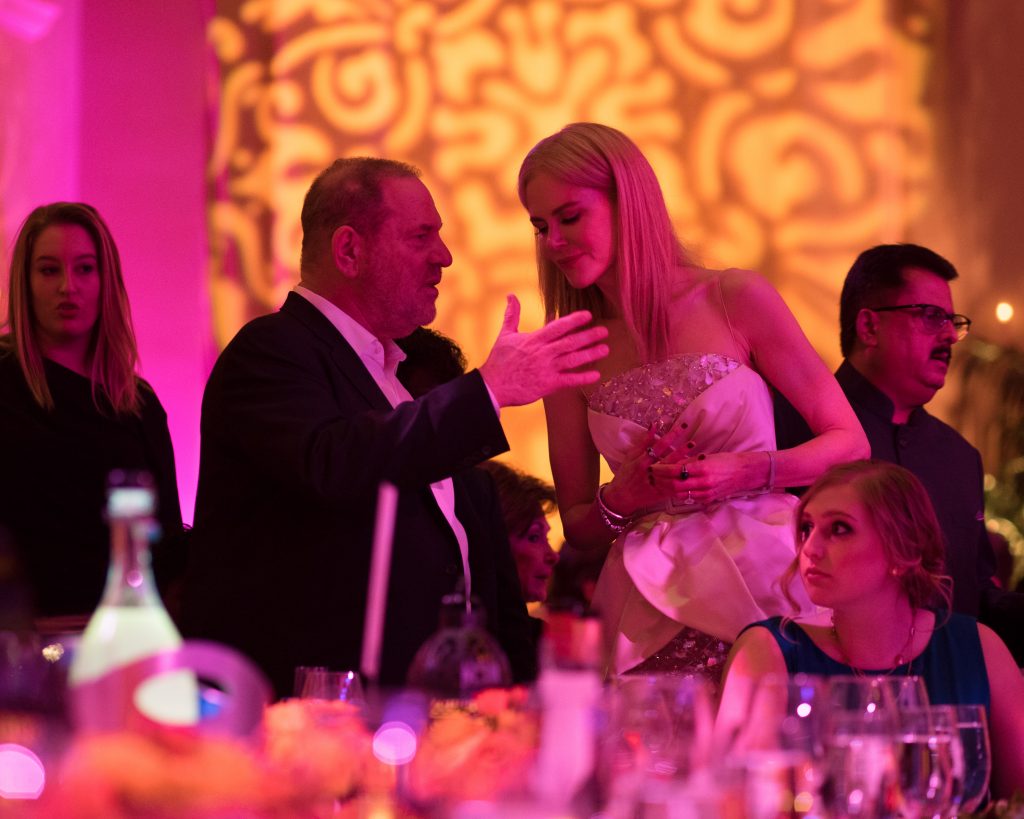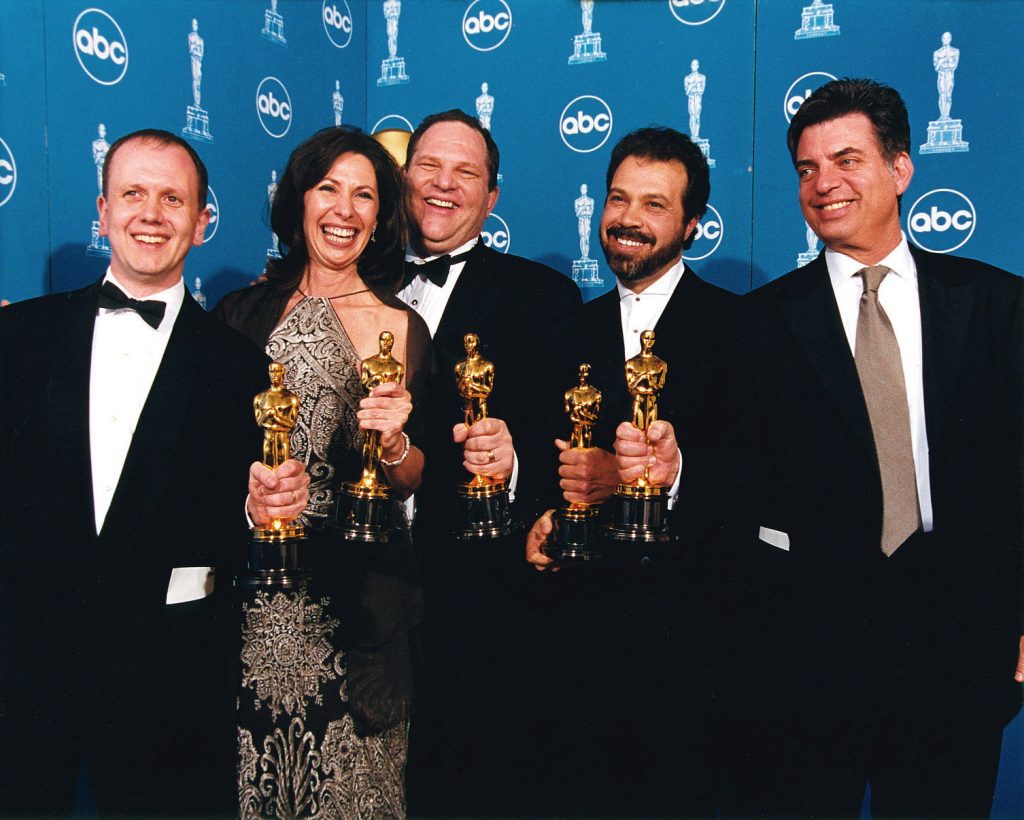October 13, 2022
by Carla Hay

Directed by Maria Schrader
Culture Representation: Taking place mostly in 2016 and 2017, primarily in New York City (and briefly in California, the United Kingdom, Ireland, and Italy), the dramatic film “She Said” (based on real events) features a predominantly white cast of characters (with a few African Americans and Asians) representing the working-class, middle-class and wealthy.
Culture Clash: New York Times reporters Jodi Kantor and Megan Twohey investigate sexual abuse allegations against entertainment mogul Harvey Weinstein and help usher in a new era in the #MeToo movement.
Culture Audience: “She Said” will appeal primarily to people who are interested in watching well-acted historical dramas about investigative journalism and seeking justice for crimes.

With the tone and pace of a procedural crime drama, “She Said” uncovers nothing new about The New York Times’ 2017 report that helped spur the downfall of Harvey Weinstein, who went from being a powerful mogul in the entertainment industry to becoming an imprisoned, convicted rapist. However, the movie’s top-notch cast members (including a terrific Samantha Morton in a standout supporting role) deliver better-than-average performances in this important story that needs to be told. It’s a very female-driven movie that puts the narrative where it belongs: on Weinstein’s abuse survivors who had the courage to speak to The New York Times for this groundbreaking report, as well as the two women who investigated and wrote this report.
Directed by Maria Schrader and written by Rebecca Lenkiewicz, “She Said” is adapted from the 2019 non-fiction book “She Said: Breaking the Sexual Harassment Story That Helped Ignite a Movement,” written by Jodi Kantor and Megan Twohey, the two New York Times reporters who investigated and wrote the report that exposed accusations against Weinstein for crimes and misdeeds against women, spanning several decades as far back as the 1980s. The report, which was published in October 2017, included detailed accounts of sexual harassment and/or sexual assault alleged by a variety of women, including some of Weinstein’s former employees, famous actresses (such as Gwyneth Paltrow and Ashley Judd) and various other colleagues. “She Said” had its world premiere at the 2022 New York Film Festival in New York City.
“She Said” opens with a flashback to 1992. In this scene, a 21-year-old female production assistant is on a film set in Ireland. She comes across as an eager and friendly employee who’s happy to be at her job and enjoys being around her co-workers. The movie then abruptly shifts to showing her running in fear on a city street, as if she’s just experienced something terrifying.
It’s at this point you know that this woman has become one of Weinstein’s sexual abuse victims. In 1992, Weinstein (who co-founded Miramax Films and later The Weinstein Company) was on the rise in the industry as a movie producer and studio chief. He would eventually win an Academy Award for Best Picture, for 1998’s “Shakespeare in Love.”
Later on in “She Said,” which takes place mostly in 2016 and 2017, viewers find out that this frightened young woman’s name is Zelda Perkins. And 25 years after her horrifying experience with Weinstein left her with deep trauma and disillusionment about the entertainment industry, Zelda (played by Morton) is ready to tell her story to The New York Times. It’s by far the best scene in the movie. She declares, “This is bigger than Weinstein. This is about the system protecting abusers.”
“She Said” goes step-by-step in showing how Jodi Kantor (played by Zoe Kazan) and Megan Twohey (played by Carey Mulligan) ended up working together on this landmark investigation which helped bring a surge to the #MeToo movement and garnered a Pulitzer Prize for Kantor and Twohey. (For the purpose of this review, the movie characters will be referred to by their first names, while the real-life people will be referred to by their last names.) Someone who is briefly mentioned (but never shown) in the movie is investigative journalist Ronan Farrow, who also won a Pultizer Prize for his own Weinstein exposé that The New Yorker published a day after The New York Times’ report. “She Said” portrays Farrow’s report as something that Jodi and Megan were aware was happening simultaneously, but Farrow’s competing report did not distract Jodi and Megan from their own investigation.
Jodi’s and Megan’s respective personal lives are shown tangentially for context reasons, in order to give viewers an idea of how this investigation affected their lives outside of their jobs. Jodi and Megan both have loving, supportive husbands (Jodi’s journalist husband Ron Lieber is played by Adam Shapiro; Megan’s literary-agent husband Vadim “Jim” Rutman is played by Tom Pelphrey), but the women are at different stages in their lives when it comes to motherhood.
At the beginning of the investigation, Jodi had two daughters under the age of 12, while Megan was a mother of a newborn child. (Elle Graham has the role of Jodi and Ron’s older daughter Gracie, while Maren Heary has the role of younger daughter Nell.) Their struggles with post-partum depression are mentioned in the movie when Megan confides in Jodi about having post-partum depression, and Jodi reveals that she had this type of depression too.
“She Said” also shows that while Jodi was enthusiastic about pursuing the investigation from the beginning, Megan was more skeptical and reluctant, because many of their sources refused to go on the record, usually because they signed non-disclosure agreements with Weinstein in exchange for a monetary settlement, and/or the accusers feared retaliation. The movie takes on sinister qualities when it shows that Megan and Jodi (and some of their sources) were stalked and threatened by unidentified men who were believed to have been hired by Weinstein.
Slowly but surely, through in-person visits to interview many of the survivors in person, Jodi and Megan begin to get a growing number of women who were willing to go on the record. Judd portrays herself in the scenes where she interacts with Megan and Jodi. In real life and in the movie, Judd tells her story about how Weinstein had her blackballed from getting jobs after she rejected his sexual advances.
Two other key witnesses come forward to help with the investigation: former Weinstein employees Rowena Chiu (played by Angela Yeoh) and Laura Madden (played by Jennifer Ehle), a mother of two underage children, who was also dealing with the recent news that she would have to get a mastectomy due to her breast cancer. (Justine Colan has the role of Laura’s daughter Iris, while Wesley Holloway has the role of Laura’s son Hywel.) Yeoh and Ehle both make an impact with their admirable performances.
Jodi, the more emotionally sensitive reporter of the duo, is described by Megan at one point in the movie as “less intimidating” than Megan because Jodi is shorter and looks more approachable. There’s a well-performed scene where Jodi makes a big mistake in revealing some information to Rowena’s husband that could derail a possible interview with Rowena. Jodi is distraught by this mistake, in a powerful scene that shows the human fallibility that can happen in investigative journalism.
Megan considers herself to be a more seasoned and more jaded reporter than Jodi. Megan doesn’t like to show emotional vulnerability, but she goes through more of an emotional rollercoaster due to her post-partum depression, which she tries to hide from her colleagues, in order not to be perceived as “weak” or “incompetent.” It’s an issue that many mothers in the workforce go through in real life, and it’s handled with tasteful respect in “She Said,” with Mulligan giving a nuanced performance.
The movie also depicts some of the rejections that Jodi and Megan received from potential sources who ultimately were too afraid or uninterested in going on the record with The New York Times. And the movie also depicts some of Weinstein’s enablers, including attorney Lisa Bloom (played by Anastasia Barzee), who tarnished her feminist image when she was hired to be a paid consultant to do damage control for Weinstein. Bloom also had a book deal with Weinstein. John Schmidt (played John Mazurek), who worked for Weinstein as a chief financial officer, and attorney Lanny Davis (played by Peter Friedman), who used to be one of Weinstein’s consultants, are shown having guilt-ridden reckonings when they are confronted by Megan and Jodi about their active participation in covering up Weinstein’s abuses.
The New York Times is portrayed as approaching this story meticulously, with supportive editors who demanded a high level of accountability and evidence before publishing the report. Patricia Clarkson has a generic role as New York Times assistant managing editor Rebecca Corbett. Andre Braugher has the flashier supervisor role as New York Times managing editor Dean Baquet, who has some of the best scenes in the movie in showing how he’s not intimidated by a bully like Weinstein.
As for any portrayal of Weinstein, “She Said” wisely relegates him to just being mostly a voice, with a brief glimpses of an actor (Mike Houston) portraying Weinstein on screen, such as when he walks in a public area with members of his team. There’s a scene where Weinstein threatens Dean with legal action against The New York Times because of the investigation that he knows will expose dark secrets. In response, Dean tells Weinstein that if he wants to make any statements on the record, Weinstein needs to talk directly to Jodi and Megan.
“She Said” also includes the 2015 real-life audio recording of Weinstein trying and failing to coerce actress/model Ambra Battilana Gutierrez into his hotel suite, a day after she says he sexually groped her without her consent. She reported this crime to the New York Police Department, which investigated Weinstein for that incident at the time, but no charges were filed against him. It’s an example of how not all of Weinstein’s accusers waited years to come forward to report Weinstein’s alleged sexual misconduct against them. The movie shows in no uncertain terms that those who did go public before 2017 were silenced or ignored.
Also getting a “voice only” depiction in “She Said” is actress/activist Rose McGowan (voiced by Keilly McQuail), who is shown declining to be interviewed by The New York Times about her accusation that Weinstein raped her, because she says she felt mistreated by The New York Times in the past. In real life, McGowan would go on the record with Farrow for his coverage for The New Yorker. “She Said” also has a scene of Megan and Jodi going to Paltrow’s California home to interview this Oscar-winning “Shakespeare in Love” actress, but Paltrow is also just a phone voice in the movie. (Near the beginning of the movie, there’s also voice cameo from an actor portraying Donald Trump, who calls Megan in 2016, during his presidential campaign, to tell her that she’s a “disgusting human being” for reporting sexual harassment allegations against Trump.)
Early on in “She Said,” the movie acknlowedges that Weinstein’s downfall happened after the April 2017 downfall of former Fox News talk show host Bill O’Reilly over sexual harassment allegations. Sarah Anne Masse, who is one of Weinstein’s real-life accusers (she claims he sexually harassed her in a job interview), has a cameo role as New York Times reporter Emily Steel, who helped break the story about O’Reilly’s alleged sexual misconduct. Steel and Michael S. Schmidt co-wrote the New York Times report that exposed how News Corp. (the parent company of Fox News) paid at least $13 million to settle sexual-harassment complaints made against O’Reilly, who was eventually fired from Fox News when advertisers boycotted his show. (That settlement total is now estimated to be at least $32 million.)
“She Said” might get some comparisons to the Oscar-winning 2015 drama “Spotlight,” which was about the Boston Globe’s 2001-2002 investigation of the Catholic Church covering up priests’ sexual abuse for decades. In real life, that Boston Globe report also won a Pulitzer Prize, but “Spotlight” was very much about a male-majority team of journalists (with one token woman) doing the investigating. “She Said” is much more streamlined, because there is only one main sexual abuser being investigated, although the movie does hammer home the point many times that Weinstein was aided by a system that allowed him to get away with his crimes for years.
None of this information is surprising to anyone who followed the Weinstein scandal and the aftermath of what was reported in The New York Times and The New Yorker. There have been countless news reports and some documentaries of the same subject matter. What will resonate with viewers the most in “She Said” is exactly what the title of the movie promises: Instead of making the villain the center of the story (which true-crime movies tend to do), “She Said” is all about celebrating the bravery and fortitude of the women survivors who came forward to tell their truths, and the people who helped bring some measure of justice to stop Weinstein’s reign of terror.
Universal Pictures will release “She Said” in U.S. cinemas on November 18, 2022.






